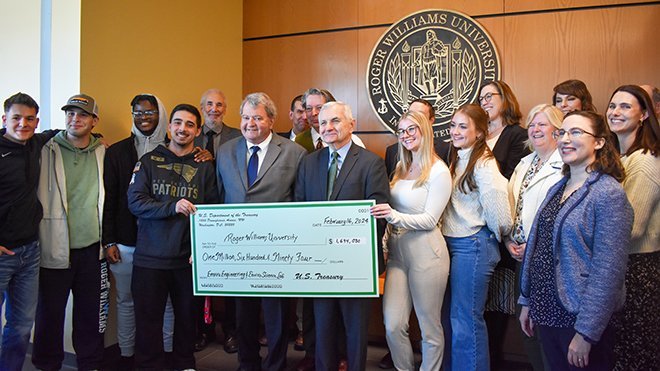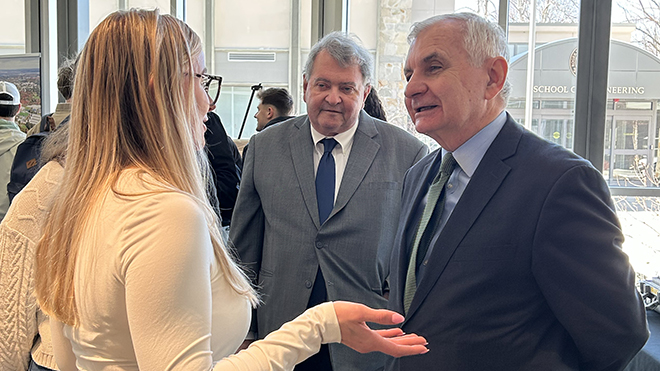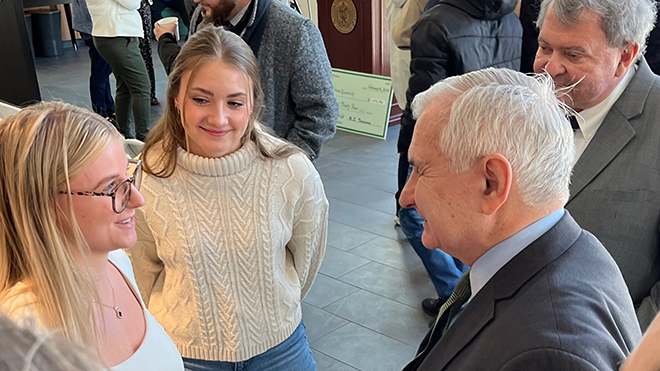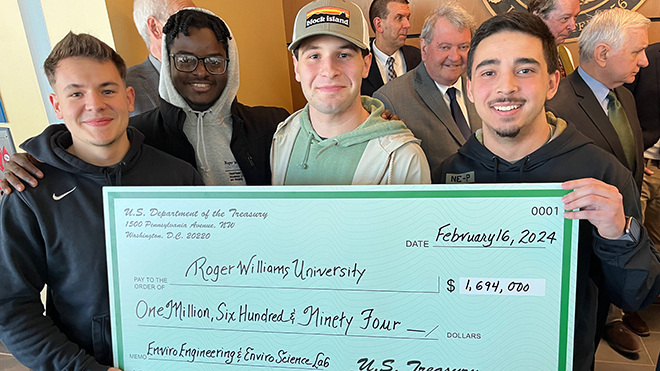Sen. Reed Delivers $1.69 Million for RWU to Research Pollutants in RI’s Coastal Ecosystems
New lab will develop coastal resiliency strategies for Narragansett Bay watershed

BRISTOL, R.I. – From analyzing water quality and soil contaminants in coastal ecosystems to detecting microplastics in our bays and watershed, Roger Williams University faculty and student-researchers have been leading important work to protect the Ocean State’s coastal communities and waters. To dive deeper into this vital work, U.S. Senator Jack Reed is teaming up with RWU to support continued research on the impacts of various forms of pollution that will help inform and develop policies that protect the environment and strengthen quality of life for Rhode Islanders.
On Friday, Feb. 16, Sen. Reed and Roger Williams University celebrated the announcement of $1.69 million in federal funding that Reed secured to help retrofit and equip RWU’s new Environmental Engineering and Environmental Science Laboratory that will study human-derived pollutants in the air, soil, and water.
“Roger Williams University has become a leader driving the region’s Blue Economy research and innovations, and with this funding we can expand and integrate that work into the Green Economy with the launch of these interdisciplinary research labs,” said RWU President Ioannis Miaoulis. “Working in labs outfitted with cutting-edge analytical equipment, our faculty and students will continue to conduct critical research on how human-derived pollutants impact our environment as well as Rhode Island’s residents. We are grateful to Senator Reed for securing the funding that will enable our continued work to address the health and vitality of our coastal ecosystems and help grow the Ocean State’s Blue Economy.”

Senator Reed recognizes that the health of Rhode Island’s bays and watersheds, soil, and air has a significant impact on the well-being of the state’s economy and communities and wants Rhode Island to have a strategic approach that bolsters coastal resiliency and ecosystem health.
“As the impacts of climate change worsen, new and innovative research is needed to support our coastal communities and protect the health of our state and its residents. This federal funding will help RWU provide the tools to help students, faculty, and researchers address those challenges,” said Senator Reed, a senior member of the Appropriations Committee. “This new lab will give students hands-on experience, working with advanced equipment to examine key issues impacting our watersheds, from microplastics that harm marine life to toxic chemicals like PFAS that invade our water systems. I look forward to seeing the great work the students and faculty will produce from this new lab and the benefits their work will bring to Rhode Island’s economy, environment, and quality of life.”

The $1.69 million earmark secured by Senator Reed in the fiscal year 2023 appropriations law will enable RWU to retrofit existing lab space and equip a new, experimental lab outfitted with cutting-edge analytical equipment to examine complex environmental research through the lenses of scientific, engineering, business, sociological, and legal perspectives. The interdisciplinary Environmental Engineering and Environmental Science Laboratory aims to make its research findings available to state officials and the business community to help inform environmental policies, plans, and workforce development initiatives that improve the ecosystem health and coastal resiliency of Rhode Island communities.
“The new lab equipment will expand and modernize the capabilities of our faculty and students to understand and limit the impact of human-derived pollution on the environment, while providing students with access to cutting-edge equipment, enhancing the student skill set and better preparing them for the workforce or graduate school,” said RWU School of Engineering, Computing and Construction Management Dean Rob Griffin.

Through the new lab, faculty and students will work on real-world research and in partnership with RWU’s Center for Economic and Environmental Development (CEED), the RWU Law Marine Affairs Institute, and the Narragansett Bay Estuary Program on Rhode Island-specific issues and research.
“This new lab and the cutting-edge analytical equipment are a win-win-win for the health of our environment, for the well-being and economic prosperity of Rhode Islanders, and for enabling more hands-on research opportunities for our students,” RWU Provost and Vice President of Academic Affairs Margaret Everett said. “The real-world learning and research at the heart of an RWU education leads to real-world impact. We are developing the next generations of scientists, engineers and workforce professionals who will become the leaders and changemakers that Rhode Island and the world needs next.”